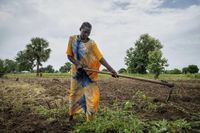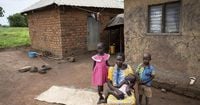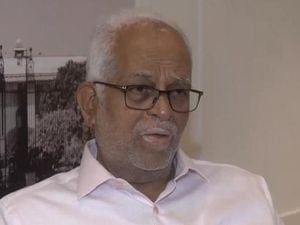Joy Falatiya’s story starts with heartbreak. In March 2024, in the violence-prone region of South Sudan, her world came crashing down when her husband forced her and their five children out of their home. With nowhere to go and little hope, Falatiya says she fell apart. The weight of her circumstances became so overwhelming that she even considered ending her life. "I thought of ending my life," Falatiya recalled, her voice tinged with the memory of despair, according to The Associated Press.
Yet, in the midst of her darkest days, Falatiya found an unexpected lifeline: a rare mental health clinic that had opened in her hometown of Mundri. This clinic, one of the few in a country where such support is nearly nonexistent, became a turning point for her. Through counseling and support, she began to recover, slowly piecing her life back together for the sake of her children and herself. "I have made a recovery thanks in part to counseling at a rare mental health clinic opened in my hometown," she told AP reporters, reflecting on the crucial role the clinic played in her journey.
But Falatiya’s fragile sense of hope is now threatened by forces beyond her control. The mental health clinic that helped her regain her footing is facing an uncertain future after its funding from Italian and Greek sources was abruptly pulled. Without these vital resources, the program’s ability to continue serving people like Falatiya hangs in the balance.
South Sudan, the world’s youngest nation, has endured years of conflict, instability, and economic hardship since gaining independence in 2011. The country’s ongoing violence and displacement have left deep scars on its people, both physically and emotionally. Yet mental health care remains a glaring gap in the nation’s fragile healthcare infrastructure. According to The Associated Press, mental health clinics in violence-prone South Sudan are rare and endangered, making the Mundri clinic’s existence all the more significant—and its potential loss all the more devastating.
For many in South Sudan, daily life is shaped by the threat of violence, the loss of loved ones, and the uncertainty of tomorrow. The trauma of displacement, family breakdown, and community strife is woven into the fabric of society. Yet, for most, there is little to no access to psychological support or counseling. The few clinics that do exist, like the one in Mundri, are lifelines for those struggling to cope with the mental toll of their experiences.
Falatiya’s story is far from unique. Across South Sudan, countless individuals and families face similar challenges. Being kicked out of her home by her husband left Falatiya not only homeless but also emotionally shattered. The stigma surrounding mental health issues and the lack of resources make it even harder for people in her situation to seek help. Many suffer in silence, their pain invisible to the outside world.
The Mundri clinic, supported until recently by Italian and Greek funding, was a rare exception. Its counselors provided a safe space for individuals to share their struggles and begin the process of healing. For Falatiya and others, the clinic was more than just a medical facility—it was a beacon of hope in a landscape marked by despair. "I have made a recovery thanks in part to counseling at a rare mental health clinic opened in my hometown," Falatiya emphasized, underscoring the impact such support can have.
But the withdrawal of international funding has cast a shadow over the clinic’s future. Without financial support, the clinic may be forced to close its doors, leaving people like Falatiya without the help they desperately need. The loss would be felt not just by current patients but by an entire community still grappling with the aftershocks of conflict and displacement.
The situation in South Sudan highlights a broader issue faced by many countries affected by conflict and poverty: mental health care is often overlooked in favor of more immediate needs like food, shelter, and physical health. Yet, as experts have long argued, mental well-being is inseparable from overall health and recovery. Without adequate support, individuals and communities may struggle to rebuild their lives, even as the guns fall silent.
International aid has played a crucial role in supporting mental health initiatives in South Sudan, but such programs are often the first to be cut when funding becomes scarce. The Mundri clinic’s predicament is a stark reminder of the fragility of these lifelines. According to The Associated Press, the program’s future is now uncertain, with no clear plan for alternative funding or support.
For those who have benefited from the clinic’s services, the prospect of losing it is deeply troubling. "I thought of ending my life," Falatiya said, recalling the depth of her despair before she found help. Her recovery, and that of others like her, stands as a testament to the power of mental health care in even the most challenging circumstances.
Yet, the risk of losing such support is not just a personal tragedy—it is a community crisis. In a country where violence and displacement are everyday realities, the need for mental health services is immense. Without them, the long-term prospects for healing and stability remain bleak.
As South Sudan continues to navigate its complex path toward peace and development, the fate of its mental health clinics hangs in the balance. The story of the Mundri clinic is emblematic of the broader challenges facing the country’s healthcare system. It is a story of resilience and recovery, but also of uncertainty and vulnerability.
For now, Joy Falatiya and others who have found solace in the clinic’s care can only hope that new sources of support will emerge. Their stories serve as a powerful reminder of the importance of mental health care, especially in places where the wounds of conflict run deep. The future of the Mundri clinic—and the well-being of those it serves—remains uncertain, but the need for its services has never been clearer.
As the world watches South Sudan’s ongoing struggles, the quiet crisis of mental health must not be forgotten. The fate of one small clinic in Mundri may seem like a minor detail in the grand sweep of global affairs, but for those who depend on it, it is everything.






